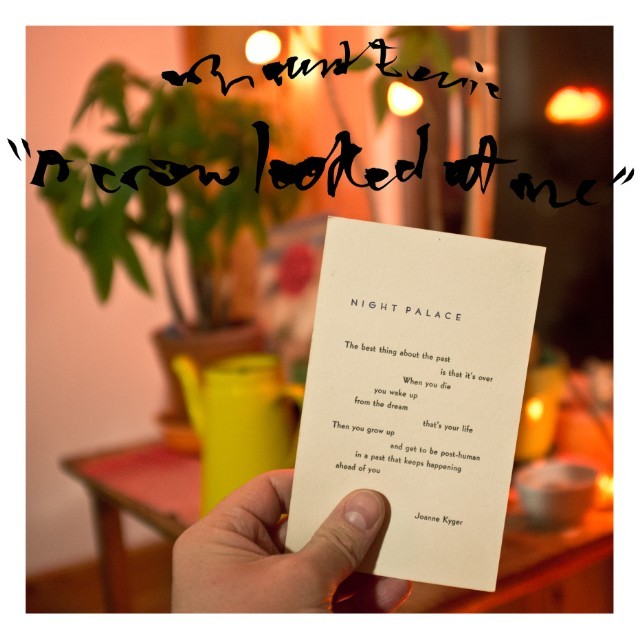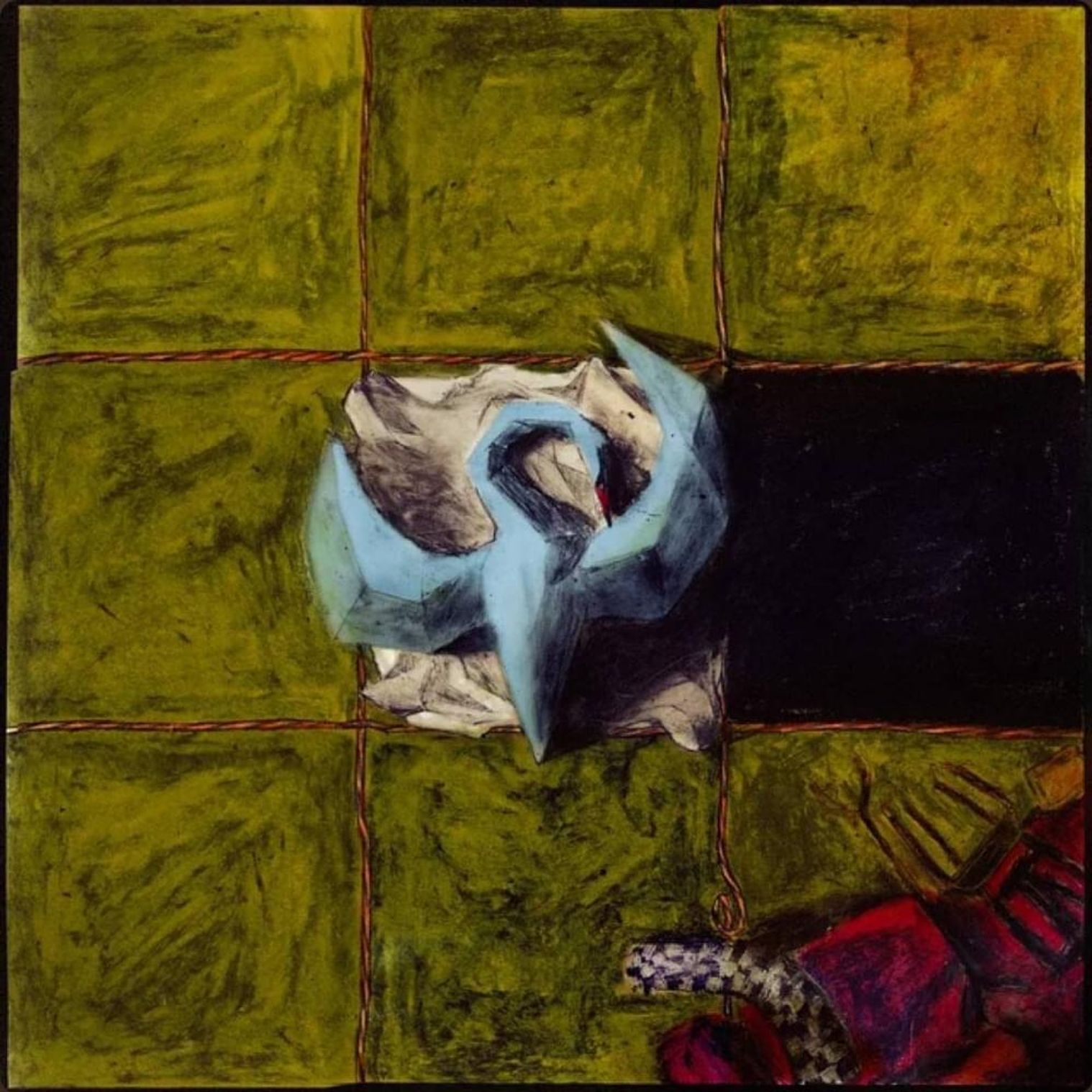"This new album is barely music." That's Phil Elverum speaking about his new Mount Eerie album A Crow Looked At Me in Jayson Greene's stunning Pitchfork profile. "It’s just me speaking her name out loud, her memory."
The "her" is Geneviève Castrée, Elverum's wife, who died last year. Castrée and Elverum were new parents when Castrée learned that she had stage-four pancreatic cancer. Their daughter was a year and a half old when Castrée died. In the months after her death, Elverum used her old instruments and recorded the album in the room where she died. Elverum sings every word on the album in a hushed half-whisper, as if there's a baby asleep in the next room -- partly because that's how Elverum always sounds and partly because there really was a baby asleep in the next room for much of the time he was making the album. The songs on A Crow aren't organized into music in any conventional way. There are no choruses and barely any melodies. Instead, we're left with soft, cold, quiet, welcoming instrumental backdrops and Elverum speaking, in beautifully precise poetic language, about what it's like to see the person you love the most die in your arms.
There's been a lot of music about death lately. There's always a lot of music about death; it's one of those constants, like love, or sex, or drugs, or the feeling of being misunderstood. But in the past year or so, I've heard more great albums that were specifically about death -- specifically about specific death -- than any other time I can remember. David Bowie and Leonard Cohen came to grips with their own looming ends, and then they both died. Nick Cave and Touché Amoré, in their own ways, grappled with the losses of loved ones. Just last week, we got a really great Sorority Noise album that was mostly inspired by the death of frontman Cam Boucher's childhood best friend.
But A Crow Looked At Me isn't like any of those other albums. It isn't like any other albums, and like Elverum has said, it only barely qualifies as music. It's not an album about finding closure or communing with spirits or understanding anything. It actively resists the idea of closure or understanding. It's numb, shocked, horrified. Elverum's first words on the album are these: "Death is real. Someone's there, and then they're not. It's not for singing about. It's not for making into art." And part of what makes the album such powerful art is its refusal to acknowledge itself as such.
Elverum's music has always been almost unsettlingly private, the sort of thing where you feel like you're intruding if you enjoy it too much. He's always come across as a solitary and mysterious soul, living off on the coastal Pacific Northwest countryside and making his own soft and whispery solitary-life hymns. The Microphones' The Glow, Pt. 2 -- an album that many had considered to be, up until now, Elverum's masterpiece -- was a dense and blurry and hissy internal landscape. On previous records, Elverum has toyed around with things like folk music or black metal, but his music seemed to exist as its own genre, one that he was figuring out as he went.
On A Crow, there's a moment where Elverum sings about the moment when he was at his most antisocial, when he "said fuck the world in a finally satisfying way" and went off to live in a remote Arctic Norwegian cabin. Then he got a letter from Castrée and went back to start a life with her. They were together for 13 years, and we know all this because he tells us, in plain language, through song. And then, on that same song, he remembers the end of Castrée's life: "In January, you were alive still. But the chemo had ravaged and transformed your porcelain into some other thing. Something jaundiced and fucked."
There are moments on the album that can be, when heard in a certain light, mordantly funny: "I now wield the power to transform a grocery store aisle into a canyon of pity and confusion and mutual aching to leave," "Conceptual emptiness was cool to talk about back before I knew my way around these hospitals." More often, though, we hear Elverum trying, and failing to come to grips with his new reality: "You do belong here. I reject nature, I disagree."
You can't just listen to an album like this while you go about your day. You need to carve out the time and the emotional space to let it hit you. There's a moment where Elverum sings about getting a backpack in the mail a week after Castrée's death; she was thinking about what their kid would need when she started going to school. There are moments where Elverum sings about how his photos of Castrée are mentally replacing the memory of what it's like to know she's right there in the house. There's a moment where he sings about giving away her clothes. There's a moment where Elverum sings about putting a chair, from the house, on an island off the coast of Washington, pointing that chair westward, and then pouring Castrée's ashes onto it: "I guess so you can watch the sunset. But the truth is I don’t think of that dust as you. You are the sunset."
The moments that hit me the hardest are the ones where Elverum sings about, or to, his daughter. About her: "Today, our daughter asked me if mama swims. I told her, ‘Yes, she does. That’s probably all she does now.' What was you is now borne across waves, evaporating." To her: "Sweet kid, what is this world giving you? Smoldering and fascist, with no mother?" I break down in tears at least a couple of times every time I hear the album, and it's usually those lines that do it to me.
The amount of personal courage it must've taken to put these thoughts into music, and then to share that music with the world, is a thing I'm having trouble even contemplating. The first few months of parenthood are a sacred time, a time that I will remember with absolute reverence for the rest of my life. It's a moment when you and your people come together and blot out the rest of the world as much as possible, when you burrow into each other. For death to come along and penetrate and shatter that bubble -- the thought of it is just obscene. Elverum lived that, and now, traumatized as he must be, he's telling us about it. In interviews, he's suggested that he's doing this because making and releasing music is all he knows how to do. Maybe. But since hearing the album, I've wanted to hold my family closer, to appreciate every moment more. In his darkest moment, Elverum has done me that service. I am grateful.
A Crow Looked At Me is out 3/24 on P.W. Elverum & Sun. Stream it below.
Other albums of note out this week:
• Pallbearer's heavy, viscous melodic doom odyssey Heartless.
• The Jesus And Mary Chain's deeply satisfying reunion LP Damage And Joy.
• Mike Will Made-It's all-star compilation Ransom 2.
• The Hold Steady frontman Craig Finn's solo album We All Want The Same Things.
• The Bug and Earth's cross-genre collaboration Concrete Desert.
• Show Me The Body's guest-heavy mixtape Corpus I.
• Boss Hog's wrathfully bluesy reunion joint Brood X.
• Wolf Eyes' noise attack Undertow.
• Pavement co-founder Spiral Stairs' solo effort Doris & The Daggers.
• Raekwon's reliably raspy The Wild.
• Pontiak's churning space-rocker Dialectic Of Innocence.
• Arbouretum's woodsy psych-rocker Song Of The Year.
• Feral Ohms' urgently fuzzy self-titled psych-rock debut.
• Hiccup's nervous DIY debut Imaginary Enemies.
• Tonstartssbandht's moody, lo-fi Sorcerer.
• The Spirit Of The Beehive's murky rocker Pleasure Suck.
• You'll Never Get To Heaven's dreamy lo-fi ambient album Images.
• Snakehole's sludgy noise-rocker Interludes Of Insanity.
• Memoriam's old-school death metal ripper For The Fallen.
• Laetitia Sadier Source Ensemble's bloopily adventurous Finding Me Finding You.
• Soulwax's improvised first-take experiment From Deewee.
• Fucked Up's Year Of The Snake EP.
• PINS' The Bad Thing EP.






